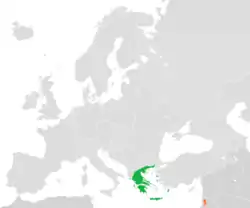Greece–Palestine relations
Greece–Palestine relations are bilateral relations between the Hellenic Republic and the State of Palestine.
 | |
Greece |
Palestine |
|---|---|
Greece has not fully formalized relations with Palestine due to many geopolitical disputes, despite the pledges of then-Prime Minister Alexis Tsipras who is a member of the left-wing Syriza Party known for its support for the Palestinian cause, to make such changes.[1] Therefore, relations between the two countries have worsened considerably.[2]
Palestine has a representative office in Athens and Greece's consulate general in Jerusalem is accredited to Palestine. In December 2015, the Hellenic parliament voted unanimously in the presence of President Mahmoud Abbas to recommend to the government the full recognition of the state of Palestine on 4 June 1967 borders with East Jerusalem as its capital.[3]
Diplomatic relations were founded with the PLO in 1981, while relations with Israel were maintained only at the consular level until Greece's formal recognition of Israel in 1990 under Mitsotakis.[4] Since the formation of current foreign policy under George Papandreou, Greece has seen a rapid improvement in relations with Israel,[5] leading the media to mark the conclusion of Greece's pro-Palestinian era.
President Karolos Papoulias has stated that Greece ultimately supports the creation of a Palestinian state alongside Israel.[6] Under previous governments, Greece garnered a reputation as a staunch supporter of the Palestinian cause.[7] Within the wider Arab–Israeli conflict, Andreas Papandreou maintained a stronger stand against Israel than any other government in the European Community.[8]
However, in December 2015, Greece's parliament voted in favour of a motion requesting that the government recognize Palestine.[9]
References
- "Greek ruling party urges Palestine recognition". www.presstv.com.
- Ahren, Raphael. "Greece officially starts using term 'Palestine'". www.timesofisrael.com.
- "Greek parliament votes unanimously to recognise Palestine". Middle East Eye édition française.
- Kaminaris, S.C. (June 1999). "Greece and the Middle East". Middle East Review of International Affairs. Rubin, Barry; Global Research in International Affairs. 3 (2). Archived from the original on 7 September 2011. Retrieved 15 August 2011.
- Marcus, Jonathan (16 October 2010). "Israel woos Greece after rift with Turkey". BBC News. British Broadcasting Corporation. Retrieved 15 August 2011.
- Karaviti, F. (13 July 2011). "Papoulias visit to Palestinian Authority". Athens News Agency: Daily News Bulletin in English (3836). Hellenic Resources Network. Retrieved 15 August 2011.
- Government of Israel. "Introduction". Greece's Relations with Israel, 1961–1967. Documents on the Foreign Policy of Israel. Israel State Archives. Archived from the original on 6 October 2011. Retrieved 15 August 2011.
- Athanasiadis, Iason (31 January 2011). "A Mediterranean Battlefield". Al Majalla. Archived from the original on 14 July 2014. Retrieved 15 August 2011.
- "Greek Parliament Recognizes Palestinian State in Symbolic Vote". Wall Street Journal. 22 December 2015. Retrieved 22 December 2015.

